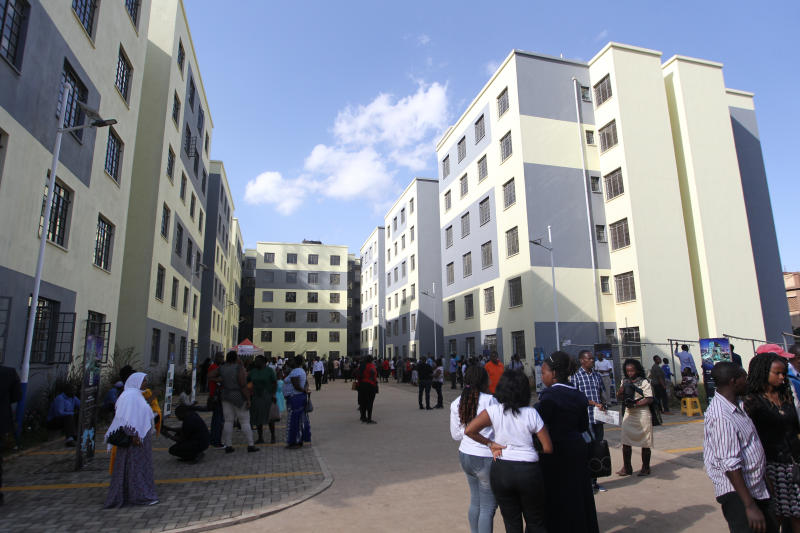By Macharia Kamau |
 Kenyans queue to view the 228 completed units
out of 1,370 being constructed by the government in Parkroad, Nairobi,
under the affordable housing programme. [Jonah Onyango, Standard]
Kenyans queue to view the 228 completed units
out of 1,370 being constructed by the government in Parkroad, Nairobi,
under the affordable housing programme. [Jonah Onyango, Standard]
Home & Away
Ambitious plan to put up half a million affordable houses by 2022 contained in Big Four Agenda
When he reads the Budget Statement in Parliament next week, Treasury
Cabinet Secretary Ukur Yatani will present proposals that could make
home ownership a distant dream for many Kenyans.
Already, high building costs and lack of cheap mortgages have ensured
many Kenyans tumble through the most productive years of their lives
without owning a home.
Mr Yatani has already made his proposals clear through the Finance Bill
2020, as well as through his measly allocations to different government
agencies at the forefront of building cheap houses.
What has also become apparent is the fact that his proposals contradict
policies mooted by other ministries meant to ensure Kenyans own homes.
The government has in the past tried to make it possible for Kenyans to
own homes, with the boldest of such efforts being the ambitious plan to
put up half a million affordable houses by 2022; an initiative enshrined
in the Big Four Agenda.
The houses are to be put up by both government and private entities.
When Yatani reads the Budget Statement, he will throw such housing plans
into disarray.
Some of the proposals are seeking more taxes from Kenyans saving for
their future homes, while others are fronting budgetary cuts for state
entities charged with overseeing that the 500,000 affordable homes are
constructed.
The budgetary allocation for the State Department for Housing and Urban Development has been slashed by more than 50 per cent.
The department has been allocated Sh14.14 billion for the 2020-21
financial year, which is Sh17 billion lower than the Sh31.5 billion that
department received in the 2019-20 financial year.
County governments
The department, housed by the Ministry of Transport, Infrastructure,
Housing, Urban Development and Public Works, is among the critical
government entities tasked with the delivery of the Big Four Agenda’s
housing dream.
To begin with, the department is charged with overseeing affordable
houses are constructed by other government agencies including county
governments.
It is also tasked with creating an enabling atmosphere for real estate
developers who plan to privately put up the houses in the struggle to
ensure the 500,000 units are put up.
One of the boldest indications that Yatani has so far made that Kenyans
will be waiting for a longer period before they can own houses is
contained in the Finance Bill 2020.
The Bill is up for debate in Parliament in the coming weeks.
It proposes that Home Ownership Saving Plans (HOSPs) be subjected to income tax.
HOSPs are savings plans that are exempt from taxes, and are aimed at
enabling people keen to buy houses to put away money that they can use
in acquiring a home.
They were introduced in 1995. At the time, only some banks and mortgage lenders were allowed to manage such saving plans.
Last year, the Finance Act 2019 allowed fund managers and investment
banks to be included in the management of HOSPs in the hope that this
would spur interest among Kenyans to save for homes.
While HOSPs may not have been a runaway success in the two decades they
have existed, subjecting them to income tax, according to analysts,
might kill them all together.
The Bill proposes to delete sections of the Income Tax Act that allows
tax deduction for HOSP contributions up to a limit of Sh96 000 per year.
The Act currently exempts interest income earned by a depositor on such deposits up to a maximum of Sh3 million.
Treasury is so intent on taxing these plans that it had earlier put the
proposal in the Tax Laws (amendment) Act, 2020 which was rejected by
Parliament.
“If passed, these proposals will discourage savings for homes through
HOSPs. These proposals were previously included in the Tax Laws
(Amendment) Act, 2020 but were subsequently rejected by Parliament,”
said Ernst & Young in a review of the Bill.
In an analysis of the Finance Bill, KPMG noted that the move contradicts
the push by the government for home ownership among Kenyans.
“Deletion of this section will discourage home ownership savings,
forcing potential home owners to shift to loans which are still eligible
for mortgage relief… it discourages savings to invest in the housing
sector which contradicts the Big Four agenda on affordable housing,”
said the analysis by KPMG.
“This proposal seeks to subject to tax income earned by financial
institutions, fund managers, investment banks and building societies
with respect to HOSP deposits. This will reduce the income available for
distribution to depositors as interest, negatively impacting their
ability to purchase homes.”
emacharia@standardmedia.co.ke
 Kenyans queue to view the 228 completed units
out of 1,370 being constructed by the government in Parkroad, Nairobi,
under the affordable housing programme. [Jonah Onyango, Standard]
Kenyans queue to view the 228 completed units
out of 1,370 being constructed by the government in Parkroad, Nairobi,
under the affordable housing programme. [Jonah Onyango, Standard]




No comments :
Post a Comment